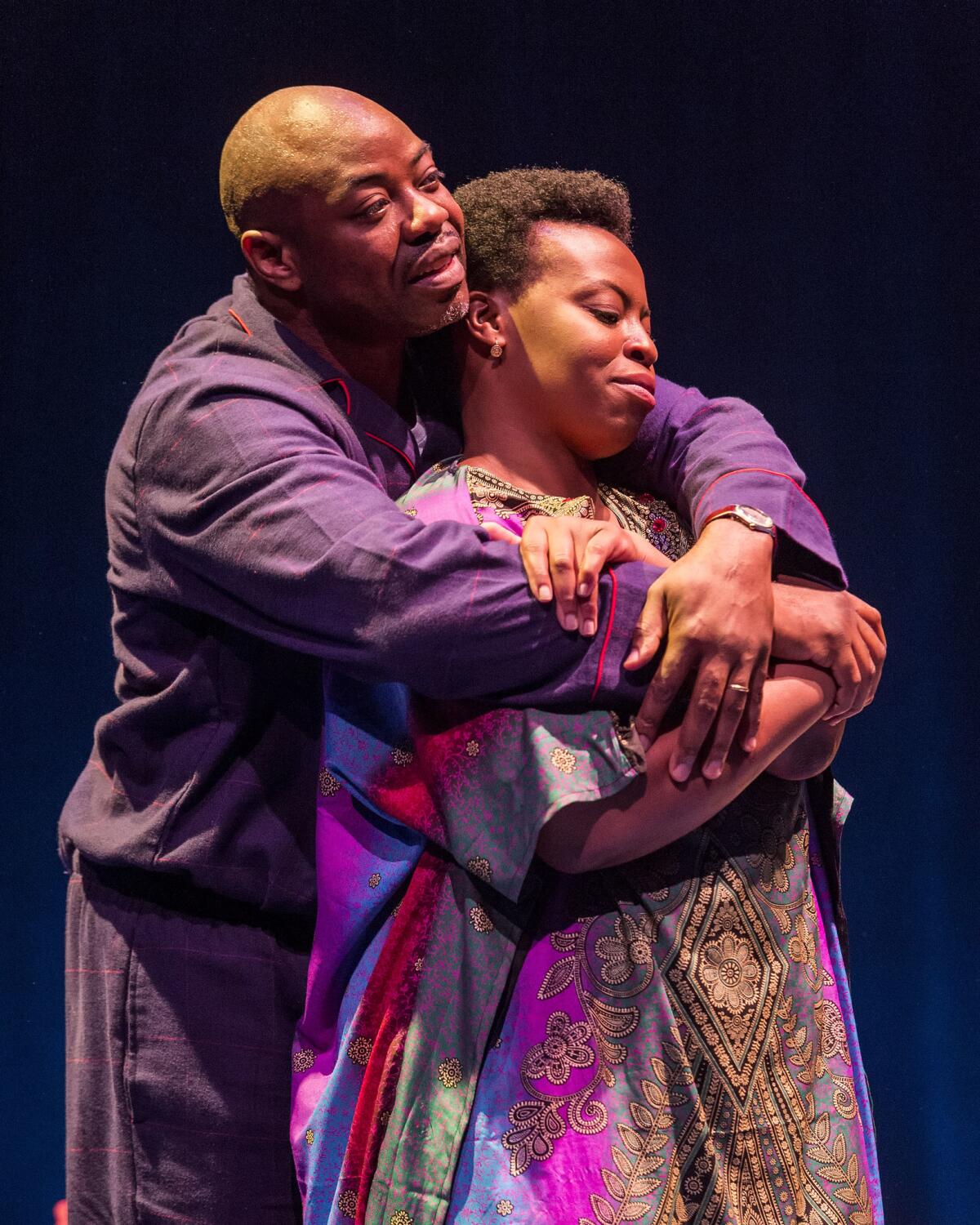Review: How do we shape memories of those we’ve lost? A friend’s death triggers ‘Good Grief’
- Share via
Ngozi Anyanwu stars in the first play she wrote herself, “Good Grief,” in its world premiere at the
The friend, MJ (Wade Allain-Marcus), wasn’t her husband, Nkechi’s father keeps reminding her. In fact, as we learn through flashbacks, MJ wasn’t even her boyfriend, although if he had lived he might have been, eventually. They took a rough path: bumpy, pitted with misunderstandings, its boundaries continuously shifting, impossible to define.
Still, without MJ, Nkechi has no idea how to move forward. She once promised him that she would remember him if he died — they talked about death a lot, late at night — and "Good Grief" represents her attempt to keep this promise. The action, as directed by Patricia McGregor, is structured as memories brought to life, with Nkechi both narrating and performing in them, editing as she goes.
When a scene gets compromised, as memories will, by fantasy or regret, she stops and starts over to present “what really happened.” The rest of the cast cooperates, obligingly acting out whatever she assigns them, in a playful range of styles — realism, comedy, farce — rearranging the pieces of Stephanie Kerley Schwartz’s set as they go. Even the lighting, designed by Pablo Santiago, seems connected to Nkechi's nervous system. There is an urgency to their telling of this story, as if Nkechi will be stuck in the limbo of her grief until they get it right.

SIGN UP for the free Essential Arts & Culture newsletter »
Yet the audience never experiences Nkechi as a stagnant character. What’s most impressive about her is how easily she slips in and out of the worlds she has inhabited all her life, as, like Anyanwu, a second-generation Nigerian American growing up in suburban America.
Nkechi eats Egusi soup with her mother, NeNe (Omoze Idehenre), a psychiatric nurse-in-training who mixes African proverbs and psychobabble; Nkechi talks football with her hectoring Papa (Dayo Ade), who adores her even though he doesn't understand her grief. With her brother, Bro (Marcus Henderson), who insists on talking like a character on “The Wire," Nkechi drinks malt liquor out of paper bags and listens to hip-hop. We see scenes from her suburban American adolescence, when she explored gender roles with MJ after school. As a would-be writer, occasionally visited by a group of celestial muses in glittery outfits, she's conscious of her position in human history and even the cosmos.
Nkechi faces pressures from all directions to define herself in particular ways: as a good daughter; as the exotic kid on the playground who answers to “N” because nobody can pronounce her name; as an ordinary American teenager; as a worthy vessel for eternal truths. But she remains fiercely herself: witty, cutting, curious, tough, defensive, vulnerable and unsatisfied by conventional wisdom. No wonder it’s sometimes hard for her to get out of bed.
This script won the 2016 Humanitas/Center Theatre Group Playwriting Prize and the further honor of this full production, which confirms its theatricality and accessibility. The character of Nkechi, if not entirely autobiographical, clearly owes a great deal to Anyanwu herself, and her performance is persuasive and endearing.

But where she really shines as a playwright is in her generosity to her supporting characters. Nkechi’s family members, particularly, are so abundantly human, so flawed, foolish, good-hearted and bursting with emotions, they can’t quite find the words to express, that the well-chosen actors who play them keep threatening to run away with the show. Indeed, with her vivid writing, Anyanwu seems to be encouraging them to do so. It’s hard not to want more of the cynical, large-hearted Bro. Papa and NeNe, in their single scene together, display such an adorably frisky, fractious dynamic that they cry out for their own sitcom.
Allain-Marcus does a nice job with MJ’s punchy dialogue, if he doesn’t quite muster the charisma this outsized role demands of him. Nkechi also has another love interest, Jimmy Deering, the homecoming king. Mark Jude Sullivan takes on this role amiably and with gusto, but the character never attains the vividness of the others, and his purpose in this otherwise delicately structured drama remains a bit murky. Some autobiographical details along the way feel a bit random, or incompletely incorporated into the storytelling.
But these quibbles don't dull the play's promise. The echo of Charlie Brown's famous exclamation in the title may be entirely coincidental. But like
♦ ♦ ♦ ♦ ♦ ♦ ♦ ♦ ♦ ♦
‘Good Grief’
Where: Kirk Douglas Theatre, 9820 Washington Blvd., Culver City.
When: 8 p.m. Tuesdays-Fridays, 2 and 8 p.m. Saturdays, 1 and 6:30 p.m. Sundays; ends March 26. Call for exceptions.
Tickets: $25 to $70 (subject to change)
Information: (213) 628-2772 or www.centertheatregroup.org
Running time: 1 hour, 30 minutes, no intermission
Follow The Times’ arts team @culturemonster.
ALSO
'God Looked Away,' and so should you: Why Al Pacino's play falls short
'Fun Home' weaves tragedy and comedy into an original American musical
Sex! Savagery! Singing! It's 'Game of Thrones' as musical parody
'The Humans' and David Henry Hwang musical to lead Ahmanson's 2017-18 season
The biggest entertainment stories
Get our big stories about Hollywood, film, television, music, arts, culture and more right in your inbox as soon as they publish.
You may occasionally receive promotional content from the Los Angeles Times.







